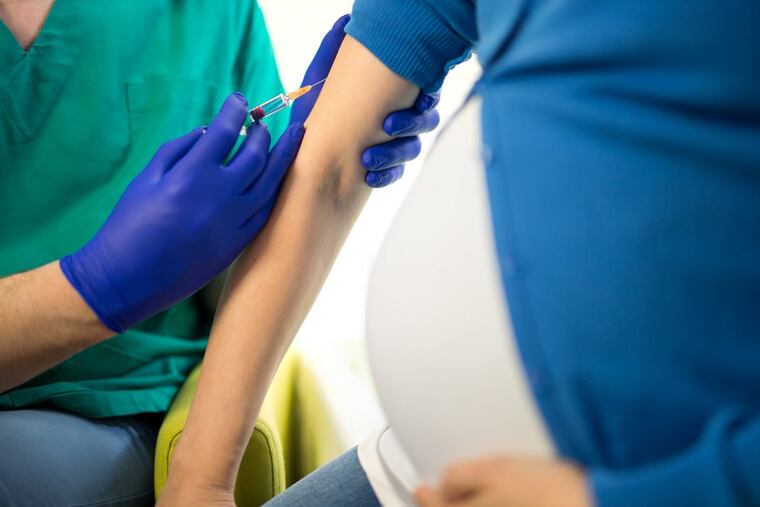Most pregnant women don’t get recommended flu and whooping cough vaccines
It's a no-brainer: If you're pregnant, get these vaccines to protect you and your baby.

Pregnancy increases the chance of being hospitalized with influenza. Flu and whooping cough can be deadly to infants.
Yet only about a third of pregnant women reported getting both a flu and a whooping cough (Tdap) vaccination last year, according to the latest federal report on the issue, issued Tuesday.
“I want to reinforce that all expectant mothers should be up-to-date with recommended vaccinations as part of their routine prenatal care,” Robert Redfield, director of the U.S. Centers for Disease Control and Prevention, said in a news release. “CDC strongly recommends that health-care providers speak with moms-to-be about the benefits.”
But the latest data show that even when providers do that, many women say “no thanks.” Although 75% of women surveyed last spring said the vaccines had been offered, 34% declined the flu shot and 30% declined Tdap.
» READ MORE: Flu shots save lives. Why don't more people get them?
Maternal vaccination has been inching upward for 15 years, with a big bump after the 2009 flu pandemic showed pregnant women were at higher risk of severe illness, complications, and death. In 2016, the Tdap vaccination rate was 49% and the flu shot rate was 50%. Last year, the vaccination rate for each was about 55%; fewer women get both.
Misconceptions about the immunizations persist. Of women surveyed last spring, 18% believed the flu vaccine was ineffective, 38% didn’t know the shots are needed during each pregnancy, and 16% had safety concerns.
» READ MORE: Americans continue to be ignorant, indifferent about the cancer-preventing HPV vaccine
Two years ago, in response to an inconclusive study that linked the flu shot and miscarriage, the CDC and the American College of Obstetricians and Gynecologists reinforced their endorsement. Other studies have shown the safety of the flu shot during pregnancy.
“Maternal [flu] vaccination is the most important strategy to protect newborns, because the vaccine is not approved for use in infants younger than six months,” the ob-gyns group said.
Infants receive the vaccine against whooping cough, or pertussis, when they are two months old.
Pregnant women who get the flu and pertussis vaccines pass antibodies to their developing babies that continue to provide protection after birth.
Recent research shows the flu shot reduces a pregnant woman’s risk of being hospitalized with the seasonal illness by 40%, while it reduces that risk by 72% for infants under 6 months old.
Neither Pennsylvania nor New Jersey have yet had a confirmed case of the flu this flu season, but Delaware on Tuesday announced its first lab-verified case.